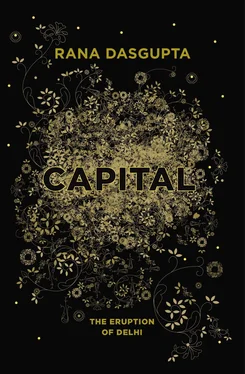We stop at a house, and enter. It belongs to a woman named Jahanara, who is sitting on a mat on the floor with a friend, Saraswati. Both have been closely involved with Meenakshi’s political campaigns on behalf of this settlement.
It is late morning, and the room is bright with the sunshine streaming through the open door. It seems large because there is almost nothing in it beyond a fridge and a stove. The walls are painted cream, and glow with the sunlight reflecting off the floor. At the back, stairs go up to the floor above.
Jahanara offers tea and gets up to make it. Meenakshi continues.
“You can see how terrible this area is. The land is marshy and prone to flooding. The first people to settle here had to dig drainage ditches before they could build anything. And even so this area is always flooded in the rainy season. This year a child died in the flood: the water came up above the houses. And even so there is no water to drink. The water in the reservoir is salty. And the groundwater here tastes of acid because the chemicals from the trash pile seep deep into the ground. It is so toxic that even mosquitoes can’t survive in it. It’s pure acid, and it burns. The kids all have rashes from bathing in it, and the women have terrible vaginal inflammations.
“These people built this town with their own hands. They could not wait years for the government to build streets and sewers so they did it themselves. They had to lobby for every brick and every bag of cement. They had to lobby for electricity. After ten years they are still lobbying. They still do not have a secondary school here. The nearest school will not accept these children because they are ‘ slum kids ’. So they have to travel far away to a school where there are 100 children in every class and there is nowhere to sit, no water and no toilet. It’s very hard for those children who are trying to go to school. Have you seen the road into this colony? After the rains, it becomes completely impassable.”
“Why did we come to this city?” interjects Jahanara. “First for work, because there was nothing in our villages in Uttar Pradesh. We knew people who were taken by labour contractors to Delhi, and they started getting good money, so eventually many of us followed. And the second reason we came was for schools. We cannot read or write, and we wanted our children to be better educated. In the village, the schools were far away. You couldn’t check that your child was actually going to school. And it was dangerous for girls to travel that far. That’s why we thought it was better to live with our husbands in the city. That’s why we came. To give a better future to our children. Especially our daughters.
“When we arrived we managed to get our two children into a school in Delhi. But it was far away and the teachers didn’t understand their situation. They failed our children because they didn’t want slum children in their school. The children got disheartened and left their studies halfway through. Now they are working as labourers. That is the worst thing about all of this. Our children lost their education.”
In the house opposite, a young woman has just emerged from the bathroom wearing a flaming pink sari. Her hair is wet: she stands in front of a mirror combing it. She puts cream on her face. She takes a long time over these rituals. Then she takes a broom and begins to sweep the floor of her house. With these narrow lanes and these windowless houses lit by open doors, everything is visible.
We drink tea in the room. Saraswati plays meditatively with Jahanara’s toes. Both women are dressed in cotton salwar kameez. Saraswati has a row of metal and plastic bangles up to her elbow. She says,
“My husband’s sister and her husband left our village for Delhi, and we did not hear from them again. My mother-in-law was very worried. She wept every day for her daughter because she didn’t hear from her for two years. She kept asking my husband to go to Delhi to find her. So he went. He looked all over this huge city, asking in every settlement if anyone had heard of his sister and her husband. After many weeks he arrived in a place on the other side of the Yamuna river. He asked if anyone knew them and someone said, ‘They live here.’ They told him to wait by the well. When he got there he saw some women were fetching water. He called out to them and asked, ‘Sisters, does a person by this name live here?’ Now his sister was one of their number, and she heard him say her name. She ran over to him, and when she saw him she began to weep. ‘Brother, what are you doing here?’ she said. My husband said, ‘Why didn’t you make any contact with us for two years? Mother has been so worried that she has become ill.’ And she said, ‘My husband gets no holidays so we cannot come back. But I wrote you so many letters and I never received a response.’ He cried, ‘But we didn’t get any of your letters!’
“After that, my brother-in-law helped him get a job in Delhi. My husband began to work on the construction of the new bridge across the Yamuna. But after five months he lost that job and he had nothing to do. One day, he found a chair. He decided he would set up as a barber on the riverbank. There was no township at that time. There was nothing except a huge pit of trash. My husband was a barber in a place where there were no people. He waited all day with his chair in the middle of a huge wasteland. The area was completely desolate and at night it was in total darkness.
“He hardly earned any money during the day, so he had to work all night as well. He was given a night job removing the trash that built up every day around the Yamuna bridge construction site. In that darkness he had to get into the river and swim to the site. He could not see anything, he just had to swim in the endless black. He worked through the night pulling corpses out of the river from where they had got stuck, and carrying away every kind of garbage. They paid him 500 rupees [$10] a month for that.
“Eventually, the government filled in the trash pit on the Yamuna bank with soil and flattened the area, and my husband and his brother-in-law built a hut on the site. More people came to live there. But my husband was feeling lonely, and he could no longer eat. He could not stop thinking about his children. He had lost his mother when he was three and his father when he was twelve, and he had no siblings. Only his children made him feel that he was not totally alone in the world. So he asked me to come to Delhi to join him.
“We lived there for almost twenty-five years. Little by little we made that place worth living in. We built everything, brick by brick. We made a two-storey home there. Eventually, the place had everything — electricity, piped water, a government school and, right nearby, a government hospital. And then they knocked down everything we had built so they could make an office for the chief minister.
“They promised us that we would own a real house with toilets and bathrooms, and we would no longer be slum people. Everyone hates slum people and we were happy: they said the word ‘slum’ will be erased from your lives. They said they would take us to a new place which would have good schools, parks, water and electricity. Our children were very happy too. None of us knew at that time that this was all fake.
“They charged us 7,000 rupees [$140] for our new house: many of us had to borrow that money or sell jewellery. But they refused to show us the place beforehand. They loaded us all into a truck; on the way, we asked the truck driver, ‘Where are we going, is the place good? Are people nice there?’ He said nothing to us. How could he? He was just doing his duty after all. And when we arrived here, it was just empty marshland. The house they had promised us did not exist. The truck driver himself said, ‘This place is not good for you. How can you live here?’ Some of us had arrived with bricks from our previous houses, but most of us didn’t have even that. The whole place was flooded and there were snakes and rats everywhere. It took six trucks of mud and more than five thousand bricks to bring the land out of the water.”
Читать дальше











